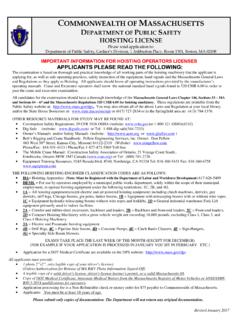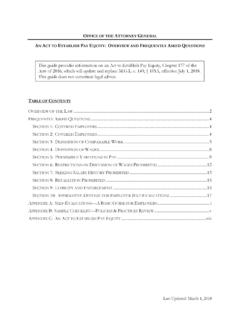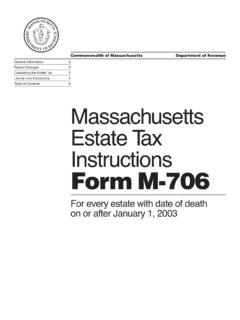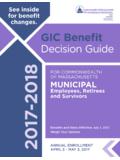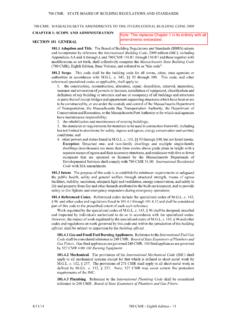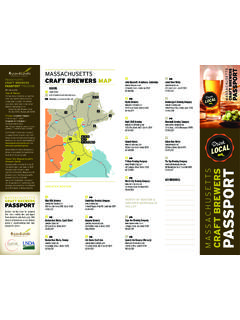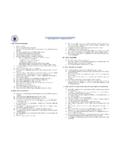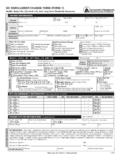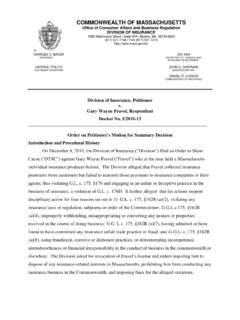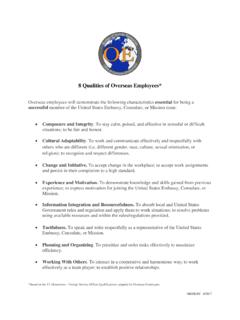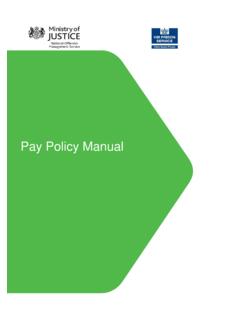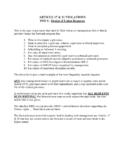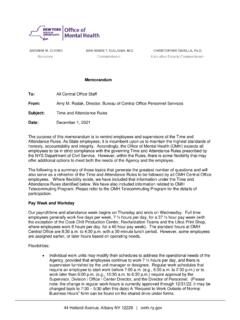Transcription of Earned Sick Time in Massachusetts Frequently Asked Questions
1 Massachusetts Attorney General's Office Earned Sick Time FAQs Earned Sick Time in Massachusetts Frequently Asked Questions These FAQs are based upon the Massachusetts Earned Sick Time Law, c. 149, 148C, and its accompanying regulations, 940 CMR The Earned Sick Time Law sets minimum requirements; employers may choose to provide more generous policies. Table of Contents Section 1: Introduction, Applicability & Eligibility .. 2. Subsection A: Introduction .. 2. Subsection B: Employees Eligible for Earned Sick Time .. 2. Subsection C: Which Employers Need to Provide Earned Sick Time? .. 4. Section 2: Paid versus Unpaid Earned Sick Time .. 5. Section 3: General Rules .. 6. Subsection A: How is Earned Sick Time Accrued? .. 6. Subsection B: Carryover of hours from one year to the next.
2 7. Subsection C: Permissible Uses of Earned Sick Time .. 8. Subsection D: Payment of Earned Sick Time .. 9. Section 4: Implementing the Earned Sick Time 11. Section 5: Using Other Paid Time Off (PTO) Policies .. 14. Section 6: Notification Requirements and Options for Employees Using Earned Sick Time .. 16. Section 7: Documentation Requirements and Options for Employers .. 17. Section 8: Recordkeeping and Disclosure Obligations for Employers .. 18. Section 9: Retaliation Prohibited .. 19. Section 10: Violations .. 19. Section 11: Additional Information ( ) .. 20. Updated September 21, 2018 1. Massachusetts Attorney General's Office Earned Sick Time FAQs Section 1: Introduction, Applicability & Eligibility Subsection A: Introduction Q: When do employers have to start complying with the law?
3 A: All employers must begin complying with the Earned Sick Time Law on July 1, 2015. Some employers who already offer paid sick leave or paid time off can keep those policies in place until December 31, 2015, provided they meet the requirements of the Attorney General's safe harbor provision (section of the regulations). Q. What does the Earned Sick Time Law do? A. The law entitles Massachusetts employees to earn up to 40 hours per year of sick leave to address certain personal and family needs. The number of hours to which an employee is entitled is related to the number of hours worked. An employee would be entitled to 40 hours of sick leave per year if the employee worked enough hours to earn 40 hours of Earned sick time. All employers must provide Earned sick time, but only employers of 11 or more employees must provide Earned sick time that is paid.
4 Smaller employers must also provide Earned sick time, but it may be unpaid. Q: Where can I find more information about the law? A: The Attorney General's website has more information about the law and regulations: Subsection B: Employees Eligible for Earned Sick Time Q: Which employees are eligible for Earned sick time? A: Most employees who work in Massachusetts are eligible, including full-time, part-time, seasonal, per- diem, and temporary employees. To be eligible, an employee's primary place of work must be in Massachusetts . Q: Are any employees exempted from Earned sick time? A: There are several types of workers who are not eligible for Earned sick time under the law: 1) an employee of the United States government;. 2) a student attending a public or private institution of higher education in Massachusetts who is: a.
5 Participating in a federal work-study program or a substantially similar financial aid or scholarship program;. b. providing support services to residents of a residence hall, dormitory, apartment building, or other similar residence operated by the institution at which the student is matriculated in exchange for a waiver or reduction of room, board, tuition, or other education-related expenses; or c. exempt from Federal Insurance Contributions Act (FICA) tax pursuant to 26 . 3121(b)(10);. 3) a school-aged student under 20 1400 et. seq., the Individuals with Disabilities Education Act (IDEA); or 4) an adult client participating in a Massachusetts licensed program and performing work duties within the program setting as part of bona fide educational or vocational training.
6 Updated September 21, 2018 2. Massachusetts Attorney General's Office Earned Sick Time FAQs Q: Does this law apply to independent contractors? A: No. Properly classified independent contractors are not employees. Determining if someone is an employee or independent contractor depends on several factors. These factors include how much supervision, direction, and control the employer has over the services being provided. Workers may meet the legal standard for classification as employees but may be misclassified as independent contractors by their employer and improperly denied access to Earned sick time and other benefits. For more information, please visit: rights/worker- Q: Does the law apply to municipal employees? A: No. Employees of a city or town, as well as local public employers not covered by the term cities and towns, such as school committees, including regional schools and educational collaboratives, are not eligible for Earned sick time.
7 Municipalities can, consistent with the state constitution, opt in to the law. Q: Does the law apply to state employees? A: Yes. Q: Are non-profit employees eligible for Earned Sick Time? A: Yes. Q: Are unionized employees eligible for Earned Sick Time? A: Yes. Q: Are domestic workers eligible for Earned Sick Time? A: Yes. Q: Are per-diem workers eligible for Earned Sick Time? A: Yes. Q: Are county employees eligible for Earned Sick Time? A: Yes. Q: Is there a minimum amount of hours that must be worked in order for an employee to be eligible for Earned sick time? A: No. Employees working very few hours will simply accrue more slowly. Q: How do I know if my primary place of work is in Massachusetts ? A: For most employees, the location where they do most of their work for their employer is their primary place of work.
8 1) If the employee spends work hours traveling outside Massachusetts (making deliveries, engaging in sales, etc.) but returns regularly to a Massachusetts base of operations before resuming a new travel schedule, Massachusetts is the primary place of work. 2) If an employee is constantly switching locations of work, the primary place of work may be determined by assessing the state in which the employee spent the plurality of his or her working time over the previous benefit year. For new employees, employers should make a reasonable Updated September 21, 2018 3. Massachusetts Attorney General's Office Earned Sick Time FAQs assessment of the primary place of work. 3) If an employee telecommutes through an arrangement with his or her employer to a Massachusetts worksite, Massachusetts is the primary place of work even though the employee does not physically spend those telecommuting hours in Massachusetts .
9 4) It is not necessary for an employee to spend 50% of the employee's working time in Massachusetts for it to be the employee's primary place of work. 5) If an employee permanently relocates into Massachusetts , the employee's primary place of work will become Massachusetts on the first date of actual work in Massachusetts . Q: What if an employee moves between worksites often enough that the employer cannot determine a primary place of work, for example, in the construction industry? How should the employer determine the primary place of work? A: Such an employee's primary place of work for a benefit year will be the state in which the employee worked for the most hours during the previous twelve-month benefit year. If the employee did not work for the employer during the previous benefit year and the employer cannot otherwise determine a primary place of work, then the employer need only allow the employee to accrue Earned sick time on hours worked in Massachusetts .
10 Q: If an employee doesn't live in Massachusetts , could he or she be eligible to earn sick time? A: Yes, if Massachusetts is his or her primary place of work. Subsection C: Which Employers Need to Provide Earned Sick Time? Q: Which employers have to provide Earned sick time? A: Nearly all employers in Massachusetts must provide their employees with the ability to accrue and use Earned sick time. The only employers not required to provide Earned sick time are the United States government, Massachusetts cities and towns, and certain other local public employers, such as school committees, including regional schools and educational collaboratives. Q: What happen to an employee's Earned sick time if their employer sells the business? A: If an employer sells its business or the business is otherwise acquired by another business, an employee will retain and may use all accrued sick time.
